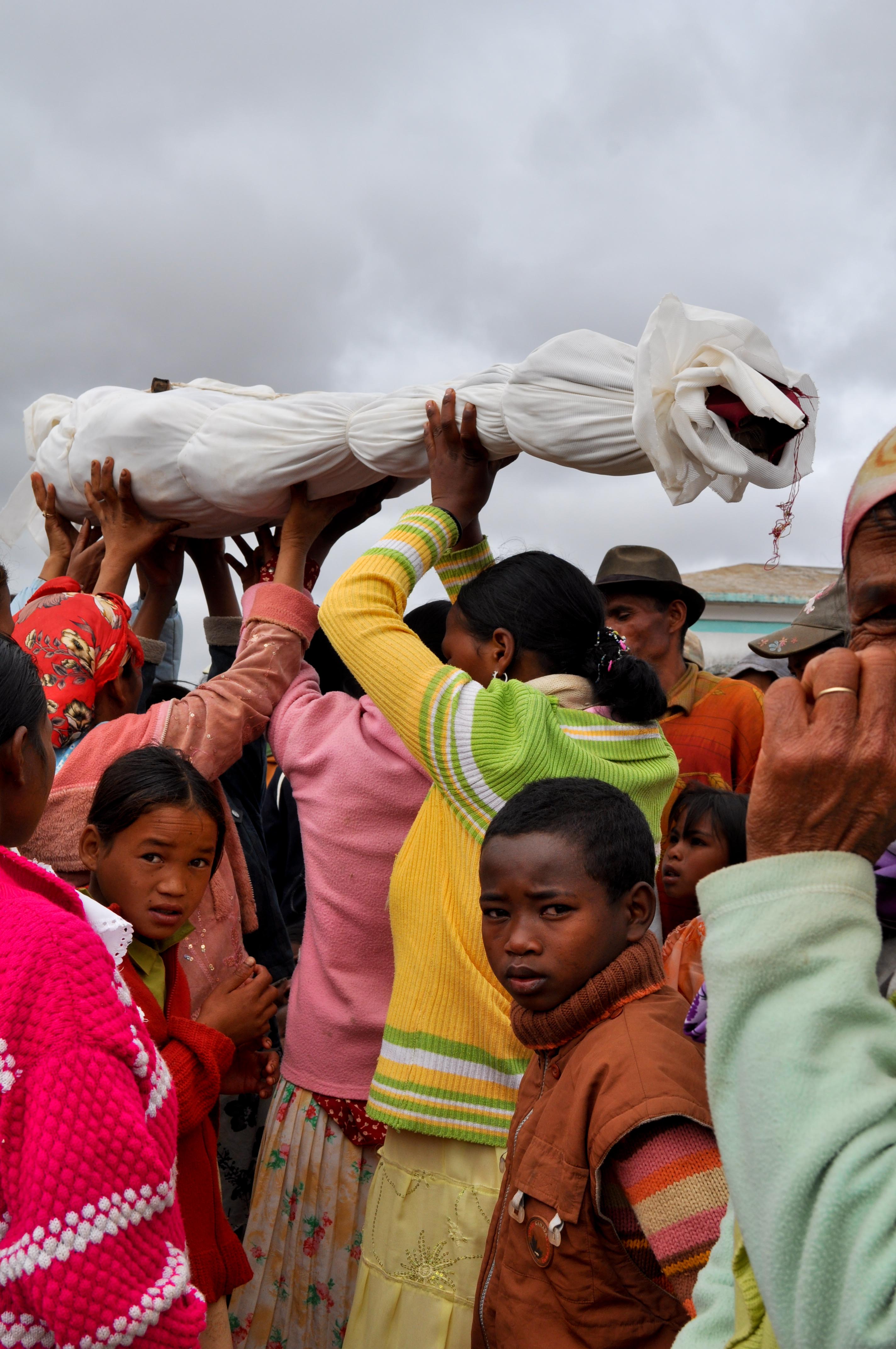Famadihana on:
[Wikipedia]
[Google]
[Amazon]
 Famadihana is a funerary tradition of the
Famadihana is a funerary tradition of the
Accessed 17 August 2008. Famadihana appears to be a custom of somewhat recent origin, perhaps only since the 17th century in its present form, although it may be an adaptation of premodern double funeral customs from
Dead Join the Living in a Family Celebration
Culture of Madagascar Malagasy words and phrases Death customs
 Famadihana is a funerary tradition of the
Famadihana is a funerary tradition of the Malagasy peoples
The Malagasy ( or ) are a group of Austronesian-speaking ethnic groups indigenous to the island country of Madagascar, formed through generations of interaction between Austronesians originally from southern Borneo and Bantus from Southeast ...
of Madagascar
Madagascar, officially the Republic of Madagascar, is an island country that includes the island of Madagascar and numerous smaller peripheral islands. Lying off the southeastern coast of Africa, it is the world's List of islands by area, f ...
. During this ceremony, known as ''the turning of the bones'', people bring forth the bodies of their ancestors from the family crypts, rewrap the corpses in fresh cloth, and rewrite their names on the cloth so they will always be remembered. Then they dance to live music while carrying the corpses over their heads and go around the tomb before returning the corpses to the family tomb. They believe in celebrating the life lived by the dead person."Madagascar's dance with the dead" BBC
The British Broadcasting Corporation (BBC) is a British public service broadcaster headquartered at Broadcasting House in London, England. Originally established in 1922 as the British Broadcasting Company, it evolved into its current sta ...
, 16 August 200Accessed 17 August 2008. Famadihana appears to be a custom of somewhat recent origin, perhaps only since the 17th century in its present form, although it may be an adaptation of premodern double funeral customs from
Southeast Asia
Southeast Asia is the geographical United Nations geoscheme for Asia#South-eastern Asia, southeastern region of Asia, consisting of the regions that are situated south of China, east of the Indian subcontinent, and northwest of the Mainland Au ...
and Oceania
Oceania ( , ) is a region, geographical region including Australasia, Melanesia, Micronesia, and Polynesia. Outside of the English-speaking world, Oceania is generally considered a continent, while Mainland Australia is regarded as its co ...
. The custom is based upon a belief that the spirits of the dead finally join the world of the ancestors after the body's complete decomposition and appropriate ceremonies, which may take many years. In Madagascar, this became a regular ritual usually once every five to seven years, and the custom brings together extended families in celebrations of kinship, sometimes even those with troubled relations.
The practice of Famadihana is on the decline due to the expense of silk
Silk is a natural fiber, natural protein fiber, some forms of which can be weaving, woven into textiles. The protein fiber of silk is composed mainly of fibroin and is most commonly produced by certain insect larvae to form cocoon (silk), c ...
shroud
Shroud usually refers to an item, such as a cloth, that covers or protects some other object. The term is most often used in reference to ''burial sheets'', mound shroud, grave clothes, winding-cloths or winding-sheets, such as the Jewish '' ...
s and belief by some Malagasy that the practice is outdated. Early missionaries discouraged the practice, and Evangelical Christian
Evangelicalism (), also called evangelical Christianity or evangelical Protestantism, is a worldwide, interdenominational movement within Protestantism, Protestant Christianity that emphasizes evangelism, or the preaching and spreading of th ...
Malagasy have abandoned the practice in increasing numbers. The Catholic Church
The Catholic Church (), also known as the Roman Catholic Church, is the List of Christian denominations by number of members, largest Christian church, with 1.27 to 1.41 billion baptized Catholics Catholic Church by country, worldwid ...
, however, no longer objects to the practice, because it regards Famadihana as purely cultural rather than religious. As one Malagasy man explained to the BBC, "It's important because it's our way of respecting the dead. It is also a chance for the whole family, from across the country, to come together."
Additionally, the practice of Famadihana is thought to be connected to pneumonic plague
Pneumonic plague is a severe lung infection caused by the bacterium '' Yersinia pestis''. Symptoms include fever, headache, shortness of breath, chest pain, and coughing. They typically start about three to seven days after exposure. It is o ...
transmission in the region. The Malagasy government has issued rulings forbidding the practice for individuals who died of plague, but there have been reports of people ignoring this decree.
References
{{ReflistDead Join the Living in a Family Celebration
Culture of Madagascar Malagasy words and phrases Death customs